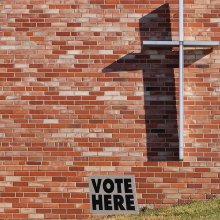consistency
I was wrapping up some research in the Stuart A. Rose Manuscript, Archives, and Rare Book Library at Emory University when I requested a box of Lucille Clifton’s personal writings. I had not come to study Clifton. I was researching anti-lynching activism in Georgia, specifically a 1936 lynching photograph. But by the end of the week, I began turning to Clifton’s personal writing as an oasis. “Resolve to try to fear less and trust more and be healthy,” she wrote in her red Writer’s Digest Daily Diary on December 31, 1979. Clifton was a published children’s book author, memoirist, activist, and the poet laureate of Maryland when she wrote those words. She was also 43, the same age I was that September day. Her body of work, which includes Two-Headed Woman and Blessing the Boats, crossed oceans, told family stories, and revealed both the sting of injustice and the heart of what’s holy.
The day after Clifton resolved to “fear less and trust more and be healthy,” she wrote in her journal that she returned to a house with “no central heat; bad plumbing; and foreclosure.” A few weeks later, the house was auctioned off to the highest bidder. She sat down and wrote something anyway.
Most people in America, whether they are religious or not, prefer consistency in the faith community to hypocrisy. One of the reasons the fastest growing demographic in religious affiliation surveys is now “none of the above” is that too many people see more religious hypocrisy than consistency.
Religion is not, at its core, politically partisan. But too often religion becomes a political tool; and we see that on both sides of the aisle. That does not mean people of faith shouldn’t have strong convictions or feelings about political issues or shouldn’t vote one way or another; or that there is a moral equivalency between the political parties and it doesn’t matter which way we vote. Elections are important, and people of faith should be voting as citizens and by their most basic values.
But let’s be clear: On Nov. 6, neither a Republican nor Democratic victory will bring in the Kingdom of God.

